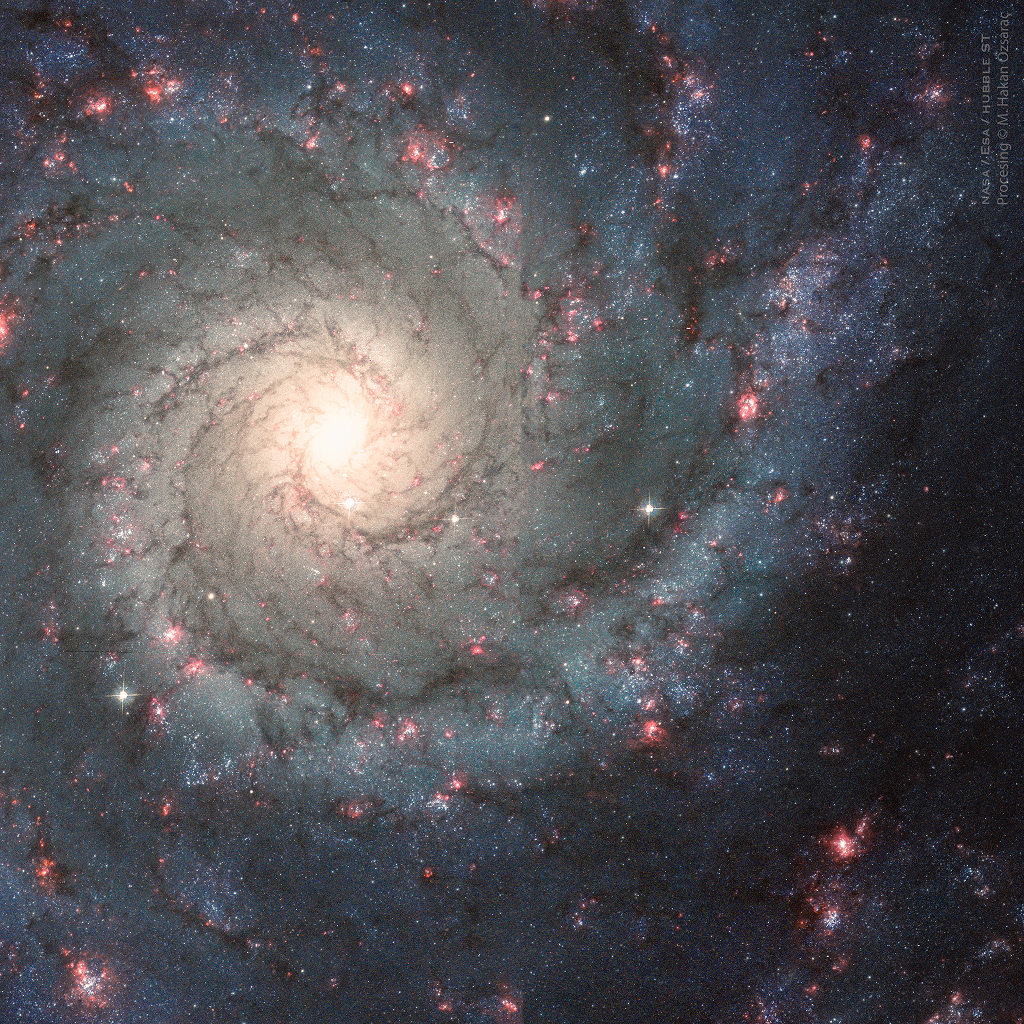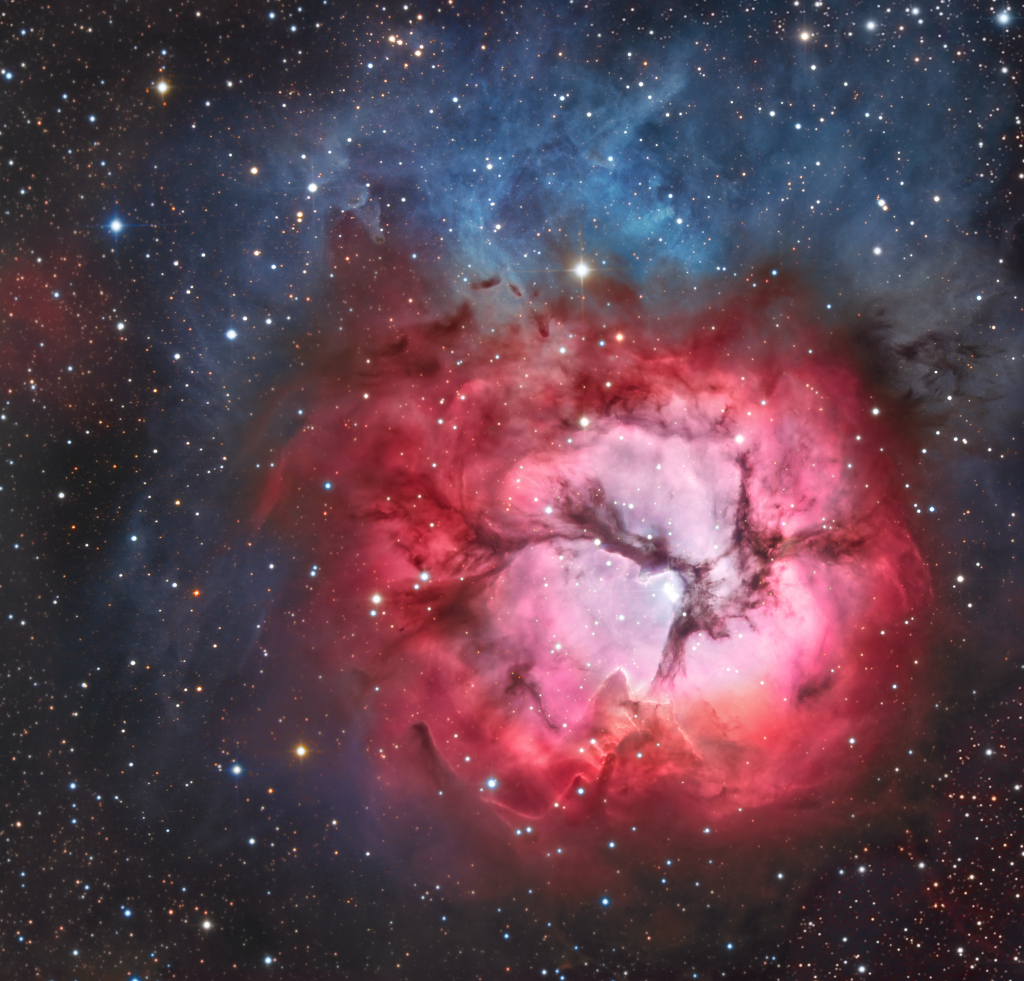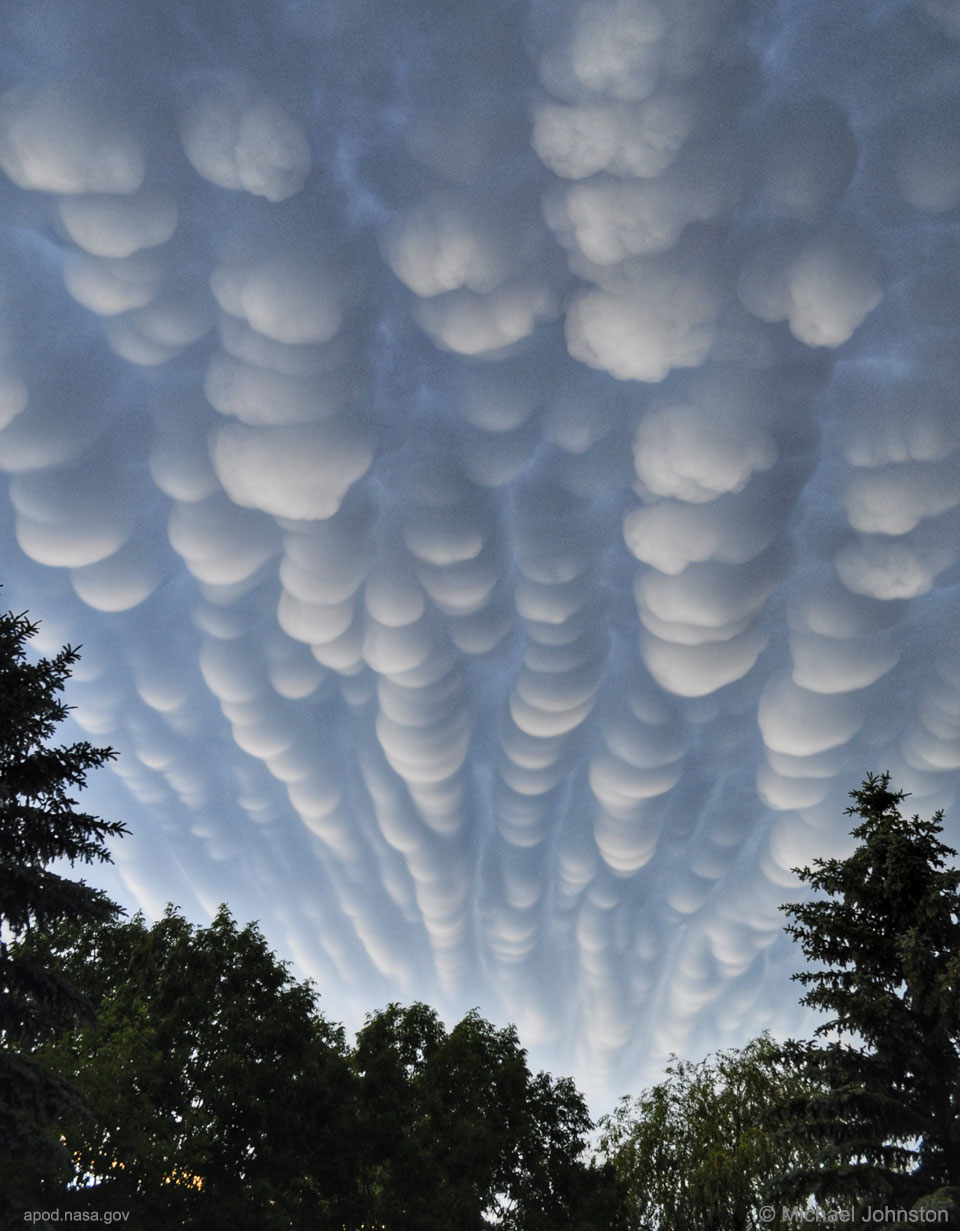Blog
An island universe of about 100 billion stars, 32 million light-years away toward the constellation Pisces, M74 presents a gorgeous face-on view. Classified as an Sc galaxy, the grand design of M74’s graceful spiral arms are traced by bright blue star clusters and dark cosmic dust lanes. This sharp composite was constructed from image data recorded by the Hubble Space Telescope’s Advanced Camera for Surveys. Spanning about 30,000 light-years across the face of M74, it includes exposures recording emission from hydrogen atoms, highlighting the reddish glow of the galaxy’s large star-forming regions. With a lower surface brightness than most galaxies in the Messier catalog, M74 is sometimes known as the Phantom Galaxy.

Mulgrew Miller (August 13, 1955 – May 29, 2013) was an American jazz pianist, composer, and educator. As a child he played in churches and was influenced on piano by Ramsey Lewis and then Oscar Peterson. Aspects of their styles remained in his playing, but he added the greater harmonic freedom of McCoy Tyner and others in developing as a hard bop player and then in creating his own style, which influenced others from the 1980s on.
Miller’s style evolved through playing with a series of major jazz figures. After leaving university he was pianist with the Duke Ellington Orchestra for three years, then accompanied vocalist Betty Carter. Three-year stints with trumpeter Woody Shaw and with drummer Art Blakey‘s high-profile Jazz Messengers followed, by the end of which Miller had formed his own bands and begun recording under his own name. He was then part of drummer Tony Williams‘ quintet from its foundation, while continuing to play and record with numerous other leaders, mostly in small groups. Miller was Director of Jazz Studies at William Paterson University from 2005, and continued to play and tour internationally with other high-profile figures in the music until his death from a stroke at the age of 57.
more...Ernest Harold “Benny” Bailey (August 13, 1925 – April 14, 2005) was an American jazz trumpeter.
A native of Cleveland, Ohio, Bailey briefly studied flute and piano before turning to trumpet. He attended the Cleveland Conservatory of Music. He was influenced by Cleveland native Tadd Dameron and had a significant influence on other Cleveland musicians, such as Albert Ayler, Bob Cunningham, Bobby Few, Bill Hardman, and Frank Wright. Bailey played with Tony Lovano, father of Joe Lovano.
In the early 1940s he worked with Bull Moose Jackson and Scatman Crothers. He later worked with Dizzy Gillespie and toured with Lionel Hampton. During a European tour with Hampton he remained in Europe and spent time in Sweden, where he worked with Harry Arnold‘s big band.He preferred big bands over small groups, and he became associated with several big bands in Europe, including the Kenny Clarke/Francy Boland B Band. His time with Quincy Jones led to a brief return to the United States in 1960. He was invited to the studio as part of Freddie Redd‘s sextet to record Redd’s Blues after meeting the pianist during a tour in Sweden, and played at the 1960 Newport Jazz Festival. He returned to Europe, first to Germany, then the Netherlands, where he settled permanently.
more...
Sir George Albert Shearing, OBE (13 August 1919 – 14 February 2011) was a British jazz pianist who for many years led a popular jazz group that recorded for Discovery Records, MGM Records and Capitol Records. Shearing was the composer of over 300 titles, including the jazz standards “Lullaby of Birdland” and “Conception“, and had multiple albums on the Billboard charts during the 1950s, 1960s, 1980s and 1990s.[2] He died of heart failure in New York City, at the age of 91.
more...
Anna Mae Winburn (née Darden; August 13, 1913 – September 30, 1999) was an influential American vocalist and jazz bandleader who flourished beginning in the mid-1930s. An African American, she is best known for having directed the International Sweethearts of Rhythm, an all-female big band that was perhaps one of the few – and one of the most – racially integrated dance-bands of the swing era.
Her first known publicized performance was singing with the studio band of Radio WOWO, Fort Wayne. She worked at various clubs in Indiana, including the Chateau Lido in Indianapolis (where she appeared under the pseudonym Anita Door).
From there she moved to North Omaha, Nebraska, where she sang and played guitar for a variety of territory bands, or groups whose touring activities and popularity were geographically limited to several adjoining states, that were led by Red Perkins. During that time Winburn was a collaborator of Lloyd Hunter, frequently singing for Lloyd Hunter‘s “Serenaders”. She also led the Cotton Club Boys out of Omaha, a group that at one point included the amazing guitarist Charlie Christian. When many of the musicians were lost to the World War II draft, Winburn joined the International Sweethearts of Rhythm. Soon she went to Oklahoma City and led bands for a short while. It was there that she led Eddie Durham‘s “All-Girl Orchestra”, which eventually earned her an invite to join the International Sweethearts of Rhythm.
more...The Petenera is a flamenco palo in a 12-beat metre, with strong beats distributed as follows: [12][1][2][3][4][5][6][7][8][9][10][11]. It is therefore identical with the 16th century Spanish dances zarabanda and the jácara.
The lyrics are in 4-line stanzas.
It is believed to be a very old style of song, as it was already mentioned by writer Serafín Estébanez Calderón in the mid 19th century, and the adherence to the rhythm of the old zarabanda seems to confirm its age. Several theories have been suggested as to its origin, although there is not enough evidence to sustain any of them unerringly:
- Theory of Paterna. This popular theory sustains that this palo originated in the town of Paterna de Rivera in the province of Cádiz. According to a legend, the name of the song refers to a cantaora (woman singer) called “La Petenera”, who was born there. She was reported to be, owing to her seduction power, the “damnation of men”. The name “Petenera” would be a phonetic corruption of “Paternera” (born in Paterna). This theory was sustained by folklorist Demófilo.
- Theory of the Jewish origin. According to this theory, suggested by flamencologist Hipólito Rossy, the petenera originated in the songs of Sephardi Jews. He even assured that Sephardi Jews in the Balkans still sang the lyrics that contain the verse of the Petenera as the “damnation of men”
- Some modern theories situate the origin of the Petenera in Petén, a department (administrative region) of Guatemala
The beautiful Trifid Nebula is a cosmic study in contrasts. Also known as M20, it lies about 5,000 light-years away toward the nebula rich constellation Sagittarius. A star forming region in the plane of our galaxy, the Trifid does illustrate three different types of astronomical nebulae; red emission nebulae dominated by light from hydrogen atoms, blue reflection nebulae produced by dust reflecting starlight, and dark nebulae where dense dust clouds appear in silhouette. But the red emission region roughly separated into three parts by obscuring dust lanes is what lends the Trifid its popular name. Pillars and jets sculpted by newborn stars, below and left of the emission nebula’s center, appear in famous Hubble Space Telescope close-up images of the region. The Trifid Nebula is about 40 light-years across. Just too faint to be seen by the unaided eye, it almost covers the area of a full moon in planet Earth’s sky.

Patrick Bruce Metheny (/məˈθiːni/ mə-THEE-nee; born August 12, 1954) is an American jazz guitarist and composer.
He is the leader of the Pat Metheny Group and is also involved in duets, solo works, and other side projects. His style incorporates elements of progressive and contemporary jazz, Latin jazz, and jazz fusion. Metheny has three gold albums and 20 Grammy Awards and is the only person to win Grammys in 10 categories. He is the brother of jazz flugelhornist Mike Metheny.
Metheny was born in Lee’s Summit, Missouri. His father Dave played trumpet, his mother Lois sang, and his maternal grandfather Delmar was a professional trumpeter. Metheny’s first instrument was trumpet, which he was taught by his brother, Mike. His brother, father, and grandfather played trios together at home. His parents were fans of Glenn Miller and swing music. They took Metheny to concerts to hear Clark Terry and Doc Severinsen, but they had little respect for guitar. Metheny’s interest in guitar increased around 1964 when he saw the Beatles perform on TV. For his 12th birthday, his parents allowed him to buy a guitar, which was a Gibson ES-140 3/4.
Metheny’s life changed after hearing the album Four & More by Miles Davis. Soon after, he was captivated by Wes Montgomery‘s album Smokin’ at the Half Note which was released in 1965. He cites the Beatles, Miles Davis, and Wes Montgomery as having the biggest impact on his music.
When he was 15, he won a scholarship from Down Beat magazine to a one-week jazz camp where he was mentored by guitarist Attila Zoller, who then invited Metheny to New York City to see guitarist Jim Hall and bassist Ron Carter.
While playing at a club in Kansas City, he was approached by Bill Lee, a dean at the University of Miami, and offered a scholarship. After less than a week at college, Metheny realized that playing guitar all day during his teens had left him unprepared for classes. He admitted this to Lee, who offered him a job to teach instead, as the school had recently introduced electric guitar as a course of study. He moved to Boston to teach at the Berklee College of Music with jazz vibraphonist Gary Burton and established a reputation as a prodigy.
In 1974 he appeared on an album unofficially titled Jaco with pianist Paul Bley, bassist Jaco Pastorius, and drummer Bruce Ditmas for Carol Goss’s Improvising Artists label. But he was unaware that he was being recorded. During the next year, he joined Gary Burton’s band with guitarist Mick Goodrick.
Metheny released his debut album, Bright Size Life (ECM, 1976) with Jaco Pastorius on bass guitar and Bob Moses on drums. His next album, Watercolors (ECM, 1977), was the first time he recorded with pianist Lyle Mays, who became his most frequent collaborator. The album also featured Danny Gottlieb, who became the drummer for the first version of the Pat Metheny Group.With Metheny, Mays, and Gottlieb, the fourth member was bassist Mark Egan when the album Pat Metheny Group (ECM, 1978) was released.
more...Alvis Edgar Owens Jr. (August 12, 1929 – March 25, 2006 Sherman, TX), known professionally as Buck Owens, was an American musician, singer, songwriter and band leader. He was the front man for Buck Owens and the Buckaroos, which had 21 No. 1 hits on the Billboard country music charts. He pioneered what came to be called the Bakersfield sound, named in honor of Bakersfield, California, Owens’ adopted home, and the city from which he drew inspiration for what he preferred to call “American music”.
While the Buckaroos originally featured a fiddle and retained pedal steel guitar into the 1970s, their sound on records and onstage was always more stripped-down and elemental. The band’s signature style was based on simple story lines, infectious choruses, a twangy electric guitar, an insistent rhythm supplied by a prominent drum track, and high, two-part vocal harmonies featuring Owens and his guitarist Don Rich.
From 1969 to 1986, Owens co-hosted the popular CBS television variety show Hee Haw with Roy Clark (syndicated beginning in 1971). According to his son, Buddy Alan (Owens), the accidental 1974 death of Rich, his best friend, devastated him for years and impacted his creative efforts until he performed with Dwight Yoakam in 1988.
Owens is a member of both the Country Music Hall of Fame and Nashville Songwriters Hall of Fame.
more...Joseph Charles Jones (August 12, 1926 – November 27, 2005) was an American R&B singer, songwriter and arranger, who was born in New Orleans, Louisiana. Jones is also generally credited with discovering the Dixie Cups. He also worked with B.B. King. As a singer, Jones had his biggest hit in the form of the Top Five 1960 R&B hit “You Talk Too Much“, which also reached No. 3 on the Billboard Hot 100 chart.
Jones served in the U.S. Navy, where he played piano in a band, before studying music at the Juilliard Conservatory of Music. He formed a band, Joe Jones and his Atomic Rebops, in the late 1940s; band members played on Roy Brown‘s 1947 hit “Good Rocking Tonight“. He was expelled from the New Orleans local chapter of the American Federation of Musicians for attempting to set up a rival organization but was later reinstated.Jones became a valet, then pianist and arranger for B.B. King. He recorded his first solo single, “Adam Bit the Apple”, for Capitol Records in 1954. He also discovered Shirley and Lee, whose recording of “Let the Good Times Roll” became a hit in 1956. In 1960, a re-recording of a song he had first recorded in 1958 for Roulette Records, “You Talk Too Much,” became a national success, but his subsequent releases were less successful.
Jones claimed to have composed many songs, including the song “Iko Iko.” Although his assertions were originally successful, a federal jury and then Court of Appeals ruled that Jones did not write “Iko Iko,” that his claims were fraudulent, and that the true writers were the band he managed, the Dixie Cups (the true original recording of this song had been released as Checker 787 by New Orleans singer and pianist Sugar Boy Crawford and his Cane Cutters in late 1953). The band hired music attorney Oren Warshavsky, who had previously won a case demonstrating that Jones falsely professed ownership of another Mardi Gras classic song, “It Ain’t My Fault.” Jones also failed in his bid to declare title (though not as an author) to yet another Mardi Gras classic song, “Carnival Time.” He also recorded the original “California Sun” on Roulette Records in 1961, which was made a hit by the Rivieras in 1963.
He later moved into music publishing, and worked tirelessly for the rights of fellow R&B acts. In 1973 Jones set up a company in Los Angeles, California, making advertising jingles.
In 2021, the Dixie Cups’ Rosa Lee Hawkins revealed that she had been sexually abused by Jones but has not let the painful memory sour her love of singing with The Dixie Cups. “We love what we do and that’s coming from our heart. When we walk onstage to perform, we leave him behind. We leave his memory behind. The only time we talk about him is if somebody calls and says they want to do an interview. We know Joe is a so-and-so, but we have to realize it was him that, as they say, discovered us on that talent show, so that’s all he deserves. He stole from us. We got one royalty check. I think it was $423 apiece.”
more...Harold “Doc” West (August 12, 1915, Wolford, North Dakota, United States – May 4, 1951, Cleveland, Ohio, United States) was an American jazzdrummer. West learned to play piano and cello as a child before switching to drums. In the 1930s he played in Chicago with Tiny Parham, Erskine Tate, and Roy Eldridge (1937–38). Late in the 1930s he filled in for Chick Webb when Webb was unable to lead his own orchestra. Early in the 1940s he played with Hot Lips Page, and played on the early bebop scene at Minton’s Playhouse in New York City with Dizzy Gillespie, Charlie Parker, Tiny Grimes, and Don Byas. He played with Oscar Pettiford in 1944 and stood in for Jo Jones occasionally in Count Basie‘s orchestra.
West appears on recordings from Slam Stewart, Leo Watson, Wardell Gray, Billie Holiday, Erroll Garner, Big Joe Turner, and Jay McShann. He died in 1951 while on tour with Roy Eldridge.
more...The fourth is a series of Rhythm Roots Workshops at the MN VA Home Adult Day Center Memory Care Unit on the Fort Snelling campus in Minneapolis. Wednesdays 10am-noon.

Normally, cloud bottoms are flat. This is because moist warm air that rises and cools will condense into water droplets at a specific temperature, which usually corresponds to a very specific height. As water droplets grow, an opaque cloud forms. Under some conditions, however, cloud pockets can develop that contain large droplets of water or ice that fall into clear air as they evaporate. Such pockets may occur in turbulent air near a thunderstorm. Resulting mammatus clouds can appear especially dramatic if sunlit from the side. The mammatus clouds pictured here, lasting only a few minutes, were photographed over Regina, Saskatchewan, Canada, just after a storm in 2012.

Thornetta Davis (born August 11, 1963) is an American Detroit blues and rhythm and blues singer. She has opened for Bonnie Raitt, Gladys Knight, and Etta James, and sang backing vocals on Bob Seger‘s 1991 album, The Fire Inside. She also worked with Kid Rock and Alberta Adams, and has released two full-length solo albums. Davis was born in Detroit, Michigan, United States.
After entering a local talent contest at the age of 15, Davis went on to join the group Jas which disbanded in 1983 and then she, and another former member of Jas, and two of her high school friends formed Chanteuse, a vocal group covering old R&B hits. She was recruited as a backing vocalist by Lamonte Zodiac & the Love Signs, a local soul group based outfit, who later became the Chisel Brothers. By 1991, Davis had moved on to back up singing for Big Chief, who recorded a couple of albums for the Sub Pop label. Following the group disbanding, Davis was signed to a solo recording contract with the same label, and issued an EP, Shout out to the Dusthuffer (1995), and the following year she released her first solo album Sunday Morning Music. One reviewer commented “Davis’ singing is just wonderful – she’s got a rich, warm voice”. A song from the album, “Cry”, was used in the “Isabella” episode of the HBO television drama, The Sopranos.Earlier in 1992, Davis had appeared at the Ann Arbor Blues and Jazz Festival, and sang on stage with Bonnie Raitt and Katie Webster.
more...Eldridge Freeman (August 11, 1921 – 2006), also known as “Buzz” Freeman or “Bruz” Freeman, was an American jazz drummer.
Born in Chicago, with his brothers, guitarist George Freeman and tenor saxophonist Von Freeman, he played for several years in the house band at the Pershing Hotel. He was also the uncle of Chico Freeman, the son of Von Freeman.
In 1950, he was a member of John Young‘s trio with LeRoy Jackson on bass, and recorded with Young’s orchestra backing vocalist Lurlean Hunter.
In the mid-1950s, he was a member of the Hampton Hawes Quartet, with Red Mitchell and Jim Hall, and with line-ups led by Herb Geller. In 1950, with his brothers George and Von (originally misidentified as Claude McLin), LeRoy Jackson, and Chris Anderson, he played with Charlie Parker shortly before his death, at a jam session recorded at Bird’s apartment which was released in 1960 by Savoy.
more...More Posts
- Sam Cooke
- J. J. Johnson
- World Music Trio Mandili
- Daily Roots Yabby You
- Cosmos NGC 2264
- Snooks Eaglin
- Lola Flores
- Juice Wilson
- Richie Havens
- FREE UKRAINE World Music Joryj Kłoc
- Daily Roots Bunny Wailer
- Cosmos NGC 253
- Jeff Tain Watts
- Jimmy Cobb
- Lead Belly
- World Music Derya Yıldırım & Grup Şimşek
- Daily Roots The Originals Orchestra
- Cabaret the Musical @ Mixed Blood
- Temple Israel Erev Shabbat Service
- Cosmos M16